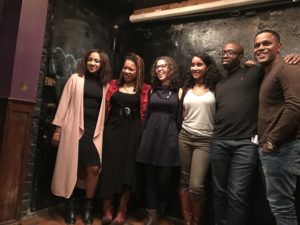Last December, I was pulling everything together for my application to the Writers’ Room fellowship. It would be difficult to quantify just how different my writing life is now. I have a new job that will make it financially feasible for me to stay on at the Room next year. I have a new place that’s quiet enough to work in. And the manuscript that was one-quarter drafted when I applied for my fellowship– a story I was, and still am, truly excited about– was finished about two weeks ago.
The revision process was nonstop, as it always is, because I absolutely love revising. I can and will work on revisions anywhere: on the train, in a waiting room, in front of the TV while my family watches a contentious football match. But drafting is a much more delicate process for me. It’s something that’s gotten harder, weirdly enough, since I’ve gotten better at writing.
It’s become harder to accept the gap between what I can envision, what I know it will eventually be, and what I write on my first go-around. It’s way too easy to go back and self-edit, to limit what I get done because I won’t let myself just get it down on the page. Every time I’m drafting a new manuscript, there’s at least one moment where I’m convinced that the last book I finished is going to be the last book I ever finish.
Being in the Room has been life-changing in that regard. Not only is it a different head space when I need to turn the world off for a few hours, but my being there at all feels like a vote of confidence that’s been hard to come by in my writing life for a while. It’s encouragement and a fire under me all at once. Every time I took the train into State Street after work, picked up my dinner and took the elevator to the fifth floor, it was to dive into the resources that have been given to me this year with the expectation that I’d use them well. With all that behind you, it’s easy to push past your uncertainties about that last bit of dialogue and just get to work.
To do that, I developed strategies that I’ll probably keep using. I doubled, and often tripled, my usual daily word counts. I know I would have finished this manuscript one way or the other, but being at the Room helped me finish it in a way I could be proud of.
The book is in other people’s hands now, and as I think about what’s next, it’s hard not to reflect on the fact that my fellowship will come to an end early next year. It’s a bittersweet feeling. But it’s fun to think that this time next year, a new crop of writers will be looking at their writing life and marveling at all the ways it’s changed.
Rebecca Mahoney, 2017 WROB Fellow
 Full disclosure: This blog post should’ve been up
Full disclosure: This blog post should’ve been up  When I arrived in Boston three years ago, it was my second cross-country move as an adult. The first took me from my native Miami to Minneapolis, to enter into the University of Minnesota’s MFA program. When I left Miami, I left with conviction; I can’t say I was certain about what I would gain from my program or my new city, but I knew I was investing in my writing career, and that was more than enough reason to go.
When I arrived in Boston three years ago, it was my second cross-country move as an adult. The first took me from my native Miami to Minneapolis, to enter into the University of Minnesota’s MFA program. When I left Miami, I left with conviction; I can’t say I was certain about what I would gain from my program or my new city, but I knew I was investing in my writing career, and that was more than enough reason to go. In second person narration, when you stands in for I—that is, when readers or secondary characters aren’t being addressed—we understand that our protagonist is both narrator and narratee; we are privy to a telling or retelling of a story handed off to, and received by, a psyche fractured by the passage of time and/ or an altered understanding of events. This fracture, I would argue, more similarly reflects how we experience the world: Subject meets stimuli and interprets then reinterprets to create narrative; we tell ourselves the story of what is happening to us as it is happening, and many times afterward. Similarly, our second person protagonist exists both within the story’s events and in the consciousness that orders and reorders the events to create meaning.
In second person narration, when you stands in for I—that is, when readers or secondary characters aren’t being addressed—we understand that our protagonist is both narrator and narratee; we are privy to a telling or retelling of a story handed off to, and received by, a psyche fractured by the passage of time and/ or an altered understanding of events. This fracture, I would argue, more similarly reflects how we experience the world: Subject meets stimuli and interprets then reinterprets to create narrative; we tell ourselves the story of what is happening to us as it is happening, and many times afterward. Similarly, our second person protagonist exists both within the story’s events and in the consciousness that orders and reorders the events to create meaning.